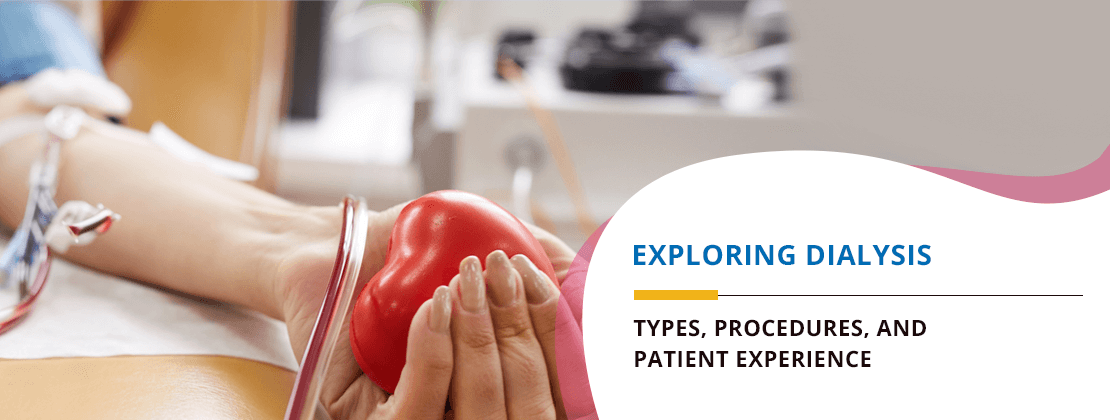
Home / Blog / Exploring Dialysis: Types, Procedures, and Patient Experience
Dialysis is a life-sustaining procedure that substitutes several normal kidney functions for those individuals suffering from kidney failure. It’s a sophisticated process, developed over decades of scientific advancements in nephrology. At HCG Hospitals, we employ state-of-the-art dialysis techniques to ensure patient safety and improve their overall health. This blog takes a deep dive into the world of dialysis, exploring its types, procedures, and what patients can expect.
Table of Contents
Dialysis is a life-supporting treatment used when your kidneys can’t do their job. Your kidneys are responsible for filtering waste and excess water from your blood. When they are damaged or aren’t working as well as they should, dialysis steps in to help keep your body in balance.
Dialysis is typically needed when you develop end stage kidney failure – usually by the time you lose about 85 to 90 percent of your kidney function and have a GFR of <15.
Hemodialysis: This treatment involves circulating the patient’s blood outside of the body through a machine that contains a special filter, called a dialyzer or an artificial kidney. The filter helps rid the blood of harmful wastes, extra salt, and fluids, helping control blood pressure and maintain a proper balance of chemicals, such as potassium and sodium.
Peritoneal Dialysis: This technique uses the patient’s own body tissues inside the abdominal cavity to act as a filter. It involves a surgical procedure to implant a catheter into the patient’s abdomen, allowing fluids to be filtered in and out. There are two types of Peritoneal Dialysis:
Continuous Ambulatory Peritoneal Dialysis (CAPD): The most common form of peritoneal dialysis, CAPD, allows for manual exchange of fluids right in the patient’s home. It doesn’t require a machine and can be performed while the patient is awake or asleep.
Automated Peritoneal Dialysis (APD): This method, also known as Continuous Cycling Peritoneal Dialysis (CCPD), uses a machine and is typically performed at night during sleep, making it a popular choice for many working individuals.
Each type of dialysis requires a different procedure:
Hemodialysis: This procedure typically takes place at a hospital or dialysis center, though it can also be performed at home with proper training. It involves inserting two needles into the patient’s arm, which are connected to the dialysis machine. The blood is drawn out, circulated through the machine where it’s cleaned, and then returned to the body. Each session usually lasts around four hours and needs to be performed three times a week.
Peritoneal Dialysis: In this procedure, a catheter is implanted into the patient’s abdomen. A special fluid called dialysate is then flowed into the peritoneal cavity, where it absorbs waste and toxins from the blood. After a few hours, the dialysate gets drained from the abdomen, taking the waste products with it. The process is then repeated.
At HCG Hospitals, we understand that starting dialysis can be a daunting experience for many. That’s why we go to great lengths to provide a comforting and supportive environment for our patients.
Daytime Dialysis: Our world-class daytime dialysis units are staffed with highly skilled nurses and technicians who are well-versed in operating modern dialysis machines and ensuring patient comfort throughout the procedure.
Night Dialysis: HCG Hospitals Ahmedabad has introduced an innovative Night Dialysis Unit for those who find it challenging to take out time during the day. This facility allows patients to undergo dialysis while they sleep, enabling them to continue their daytime routine without interruption.
Our commitment to providing top-quality healthcare extends beyond the dialysis session. Our dedicated team of nephrologists and dieticians offer personalized advice on managing diet and lifestyle to improve kidney function and overall well being.
Diet and Nutrition for Dialysis Patients: Proper nutrition is critical for dialysis patients. A dietitian can help develop a meal plan that meets your needs. Generally, a diet low in sodium, potassium, and phosphorus, but high in protein is recommended.
Exercise and Lifestyle Recommendations: Regular exercise can help improve your energy levels, muscle function, and overall health. It’s also important to avoid smoking, maintain a healthy weight, and take prescribed medications as directed.
The Department of Nephrology at HCG Hospitals is committed to providing superior care and support to patients with kidney diseases. Our team of expert Nephrologists will guide you through the journey, helping you manage your condition, and ultimately, improve your quality of life. Whether you need guidance on preventing kidney disease, managing an existing condition, or exploring dialysis options, HCG Hospitals is here to help. To learn more, please contact us today.
Do keep in mind that dialysis is a treatment, not a cure, and it can’t treat the underlying causes of kidney failure. However, it can significantly improve the quality of life for those with serious kidney problems. If you think you might need dialysis, reach out to the Department of Nephrology at HCG Hospitals for a comprehensive consultation.